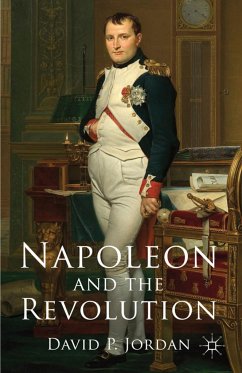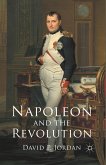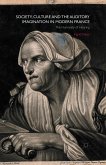This new study of Napoleon emphasizes his ties to the French Revolution, his embodiment of its militancy, and his rescue of its legacies. Jordan's work illuminates all aspects of his fabulous career, his views of the Revolution and history, the artists who created and embellished his image, and much of his talk about himself and his achievements.
A CHOICE Outstanding Academic Title
"David Jordan has a clear thesis - that Napoleon not only inherited the political changes made possible by the French Revolution but inadvertantly helped to make them permanent. The book is written with a certain panache, and Napoleon emerges as a more complex figure than has been suggested by many of his biographers." - Professor Alan Forrest, University of York, UK
"The excellent Napoleon and the Revolution is an admirable synthesis, which, without doubt, will enrich the bibliography in English and continue to make better known the reality of the man and his epoch." Thierry Lentz, Director, Fondation Napoleon, Paris
"Through fresh readings of sources including Napoleon's own memoirs as well as his contemporaries' writings about him, David Jordan argues that, in spite of his authoritarian tendencies, Napoleon always remained a self-conscious child of the Revolution. At a time when many scholars have highlighted Napoleon's repudiation of revolutionary reforms such as the granting of increased rights to women and the abolition of slavery, Jordan offers a provocative case for considering him as the man who guaranteed the survival of the Revolution's most basic innovations. Napoleon and the Revolution shows why the Emperor's legacy remains controversial, almost two centuries after his death." - Jeremy D. Popkin, University of Kentucky, USA
"Did Napoleon destroy the French Revolution? Or was he its heir? The distinguished historian David Jordan argues that Napoleon, a man of great complexity, saved the French Revolution from the fate of many subsequent revolutions. This elegant study is thought-provoking and is sure to generate vigorous debate." - John Merriman, Yale University, USA
"Readers familiar with works about Napoleon will find Napoleon and the Revolution strikingly different, challenging, refreshing, and brilliant. Here is more than simply 'rattling good history.' David Jordan tackles head-on the complex relationship of Napoleon to the French Revolution, a topic too often consigned to periphery, prologue, or epilogue in Napoleonic histories. In so doing, Jordan leaves no stone unturned, exploring the words and deeds not only of Napoleon himself, but of contemporaries, historians, and philosophers from the Emperor's day to ours. The result is not a compilation of 'for and against,' but keen, thorough, and objective analysis." - Ralph Ashby, Eastern Illinois University, USA and author of Napoleon Against Great Odds: The Emperor and the Defenders of France, 1814
"Reflecting a lifelong engagement with the French Revolution, Jordan's splendid book shows Napoleon as contemporaries understood him, as revolutionary actor par excellence, indeed the Revolution's improbable savior. Judicious, provocative, wonderfully told, the book is especially well-suited for upper division students of revolutionary Europe." John Abbot, University of Illinois, Chicago,USA
"Historians have long debated the question of Napoleon Bonaparte's relationship to the French Revolution. Was he the heir to the ideals of 1789, or did he betray them? David Jordan's answer to this question is bold and succinct: Napoleon saved the French Revolution. By that he does not mean that Napoleon embraced all that the Revolution stood for. The Empire was neither democratic nor a friend to civil liberties. But without Napoleon, Jordan argues, the French Revolution might well have suffered the fate of 20th-century revolutions in Russia, China and Cuba, all of which were isolated by the other great nations of the world and forced, by that isolation, to adopt authoritarian policies. It is a provocative thesis, presented with verve and flair in a highly readable prose. This book is a welcome addition to the literature on Napoleon Bonaparte, one that will inspire a new generation of students to join the debate over Napoleon's relation to the French Revolution and to the modern world." - Prof. Paul Hanson, Butler University, USA
'A book that is thought-provoking and engagingly written.' R.S. Alexander, H-France
"David Jordan has a clear thesis - that Napoleon not only inherited the political changes made possible by the French Revolution but inadvertantly helped to make them permanent. The book is written with a certain panache, and Napoleon emerges as a more complex figure than has been suggested by many of his biographers." - Professor Alan Forrest, University of York, UK
"The excellent Napoleon and the Revolution is an admirable synthesis, which, without doubt, will enrich the bibliography in English and continue to make better known the reality of the man and his epoch." Thierry Lentz, Director, Fondation Napoleon, Paris
"Through fresh readings of sources including Napoleon's own memoirs as well as his contemporaries' writings about him, David Jordan argues that, in spite of his authoritarian tendencies, Napoleon always remained a self-conscious child of the Revolution. At a time when many scholars have highlighted Napoleon's repudiation of revolutionary reforms such as the granting of increased rights to women and the abolition of slavery, Jordan offers a provocative case for considering him as the man who guaranteed the survival of the Revolution's most basic innovations. Napoleon and the Revolution shows why the Emperor's legacy remains controversial, almost two centuries after his death." - Jeremy D. Popkin, University of Kentucky, USA
"Did Napoleon destroy the French Revolution? Or was he its heir? The distinguished historian David Jordan argues that Napoleon, a man of great complexity, saved the French Revolution from the fate of many subsequent revolutions. This elegant study is thought-provoking and is sure to generate vigorous debate." - John Merriman, Yale University, USA
"Readers familiar with works about Napoleon will find Napoleon and the Revolution strikingly different, challenging, refreshing, and brilliant. Here is more than simply 'rattling good history.' David Jordan tackles head-on the complex relationship of Napoleon to the French Revolution, a topic too often consigned to periphery, prologue, or epilogue in Napoleonic histories. In so doing, Jordan leaves no stone unturned, exploring the words and deeds not only of Napoleon himself, but of contemporaries, historians, and philosophers from the Emperor's day to ours. The result is not a compilation of 'for and against,' but keen, thorough, and objective analysis." - Ralph Ashby, Eastern Illinois University, USA and author of Napoleon Against Great Odds: The Emperor and the Defenders of France, 1814
"Reflecting a lifelong engagement with the French Revolution, Jordan's splendid book shows Napoleon as contemporaries understood him, as revolutionary actor par excellence, indeed the Revolution's improbable savior. Judicious, provocative, wonderfully told, the book is especially well-suited for upper division students of revolutionary Europe." John Abbot, University of Illinois, Chicago,USA
"Historians have long debated the question of Napoleon Bonaparte's relationship to the French Revolution. Was he the heir to the ideals of 1789, or did he betray them? David Jordan's answer to this question is bold and succinct: Napoleon saved the French Revolution. By that he does not mean that Napoleon embraced all that the Revolution stood for. The Empire was neither democratic nor a friend to civil liberties. But without Napoleon, Jordan argues, the French Revolution might well have suffered the fate of 20th-century revolutions in Russia, China and Cuba, all of which were isolated by the other great nations of the world and forced, by that isolation, to adopt authoritarian policies. It is a provocative thesis, presented with verve and flair in a highly readable prose. This book is a welcome addition to the literature on Napoleon Bonaparte, one that will inspire a new generation of students to join the debate over Napoleon's relation to the French Revolution and to the modern world." - Prof. Paul Hanson, Butler University, USA
'A book that is thought-provoking and engagingly written.' R.S. Alexander, H-France







